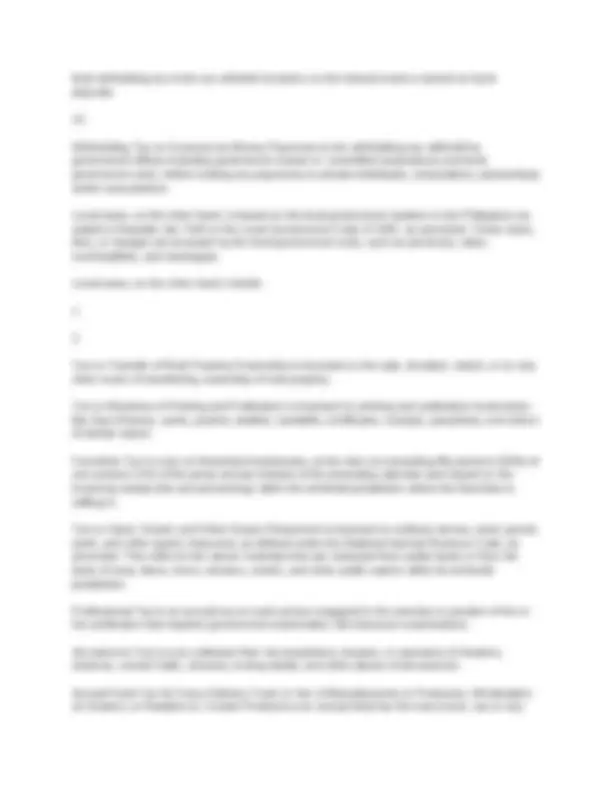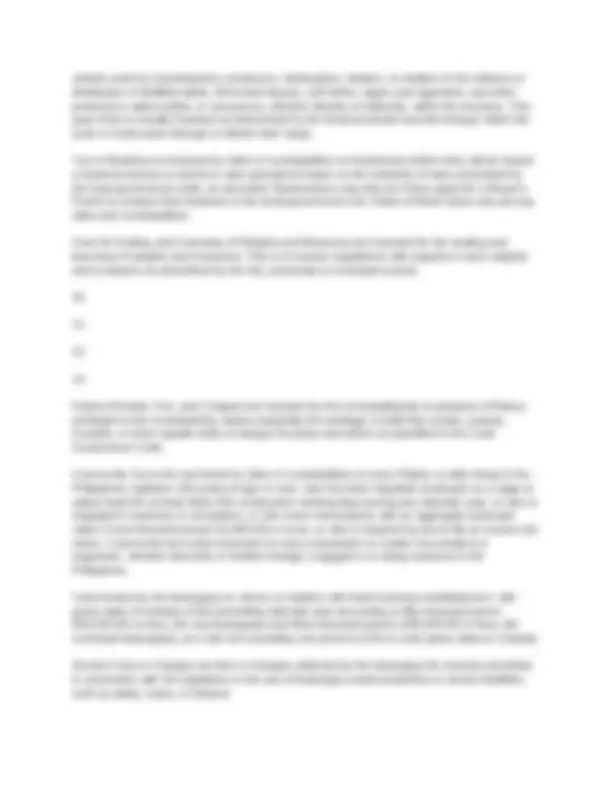





Study with the several resources on Docsity

Earn points by helping other students or get them with a premium plan


Prepare for your exams
Study with the several resources on Docsity

Earn points to download
Earn points by helping other students or get them with a premium plan
Community
Ask the community for help and clear up your study doubts
Discover the best universities in your country according to Docsity users
Free resources
Download our free guides on studying techniques, anxiety management strategies, and thesis advice from Docsity tutors
It involves discussion and handouts in taxation
Typology: Essays (university)
1 / 5

This page cannot be seen from the preview
Don't miss anything!




Taxation means laying a tax through which the government generates income to defray its expenses. It is a way to raise funds for government programs and services that benefit Filipino citizens. Economic investments and businesses in the Philippines have created several definitions of taxation enforced by national or local laws for income collection and development of the government. A tax is enforced as a contribution but it is proportionate to the citizen’s ability to pay. It is levied on persons (who actually pay with money) and property as well as on business transactions, privileges, and benefits. The imposition of taxes is done by law through the Bureau of Internal Revenue. Types of Tues There are two typos of taxes: national and local. Nanonal taxes are the ones paid to the government through the Bureau of Internal Revenue. The national taxation sysrem is based on the National Internal Revenue Code of 1997 or the Repubhc Act No. 8424 Otherwise known as the Tax Reform ACt of 1997, as amended. The types of national me: an: as follows:
Esnte Tax is a tax on the right of the deceased petson to transmit hislher estate to lawful heirs and beneficiaries at the time of death and on certain transfers which are made by law as equivalent to testamentary di5position. It is not a tax on property. It is a tax imposed on the privilege of transmitting property upon the death of the owner. The estate tax is based on the laws in force at the time of (lath notwithstanding the postponement of the actual possession or enjoyment of the estate by the
benchary. Estate tax is also based on a graduated schedule of tax rate. Income Tax is a tax on all annual profits made from property ownership, profession, trades or offices. It is also a tax on a person’s income, emoluments, profits and the like. Self-employed individuals and corporate taxpayers pay quarterly income taxes from the first quarter to the third quarter. And instead of filing quarterly income tax on the fourth quarter, they file and pay their annual income tax return for the taxable year. Individual income tax is based on graduated schedule of tax rate, while corporate income tax in based on a fixed rate prescribed by the tax law or special law. Petcentage Tax is a business tax imposed on persons or entities who sell or lease goods, properties, or services in the course of trade or business whose gross annual sales or receipts do not exceed the amount required to register as VAT-registered taxpayers. Percentage taxes are usually based on a fixed rate. They are usually paid monthly by businesses or professionals. However, some special industries and transactions pay percentage tax on a quarterly basis.
collected from the seller in the course of trade or business on every sale of properties (real or personal), lease of goods or properties (real or personal), or vendors of services. It is an indirect tax, thus, it can be passed on to the buyer, causing the increase of prices of most goods and services bought and paid by consumers. VAT returns are usually filed and paid monthly and quarterly. The latest law on Taxation is RA 9337 signed on May 24, 2005 by President Gloria Arroyo is known as the “expanded value-added tax” or the “E-VAT" law. Excise Tax is a tax imposed on goods manufactured or produced in the Philippines for domestic sale or consumption or any other disposition. It is also imposed on things that are imported. Withholding Tax on Compensation is the tax withheld from individuals receiving purely compensation income arising from an employer-employee relationship. This tax is what employers withheld in their employees’ compensation income and remit to the government through the BIR or authorized accrediting agent. Expanded Withhoiding Tax is prescribed only for certain payors like those withheld on rental income and professional income. It is creditable against the income tax due of the payee for the taxable quarter year. Final Withholding Tax is a kind of withholding tax which is prescribed only for certain payors and is not creditable against the income tax due of the payee for the taxable year. An example of
vehicle used by manufacturers, producers, wholesalers, dealers, or retailers in the delivery or distribution of distilled spirits, fermented liquors, soft drinks, cigars and cigarettes, and other products to sales outlets, or consumers, whether directly or indirectly, within the province. This type of tax is usually imposed as determined by the local provincial councils through which the truck or trucks pass through or deliver their cargo. Tax on Business is imposed by cities or municipalities on businesses before they will be issued a business license or permit to start operations based on the schedule of rates prescribed by the local government code, as amended. Businessmen pay this tax if they apply for a Mayor’s Permit to conduct their business in the local government unit. Rates of these taxes vary among cities and municipalities. Fees for Scaling and Licensing of Weights and Measures are imposed for the sealing and licensing of weights and measures. This is to impose regulations with regards to such weights and measures as prescribed by the city, provincial or municipal council.
Fishery Rentals, Pen, and Charges are imposed by the municipality/city to grantees of fishery privileges in the municipal/city waters especially the privilege to build fish corrals, oysters, mussels, or other aquatic beds or bangus fry areas and others as specified in the Local Government Code. Community Tax is the tax levied by cities or municipalities to every Filipino or alien living in the Philippines, eighteen (18) years of age or over, who has been regularly employed on a wage or salary basis for at least thirty (30) consecutive working days during any calendar year, or who is engaged in business or occupation, or who owns real property with an aggregate assessed value of one thousand pesos 01,000.00) or more, or who is required by law to file an income tax return. Community tax is also imposed on every corporation no matter how created or organized, whether domestic or resident foreign, engaged in or doing business in the Philippines. Taxes levied by the barangays on stores or retailers with fixed business establishment: with gross sales of receipts of the preceding calendar year amounting to fifty thousand pesos 050,000.00) or less, (for city barangays) and thirty thousand pesos (180,000.00) or less, (for municipal barangays), at a rate not exceeding one percent (1%) on such gross sales or receipts. Service Fees or Charges are fees or charges collected by the barangays for services rendered in connection with the regulation or the use of barangay-owned properties or service facilities, such as palay, copra, or tobacco
dryers. 14, Barangay Clearance 13 a fee collected by barangays upon lssuancc of barangay clearance, a document required for many government transactions, such as when getting a business permit from a city or municipal government or applying for a job in a government office or a priv ate company.